LifeNotes | Spring 2019

Change in EMS Stroke Protocols Make Rhode Island Hospital The First Stop for Stroke Patients
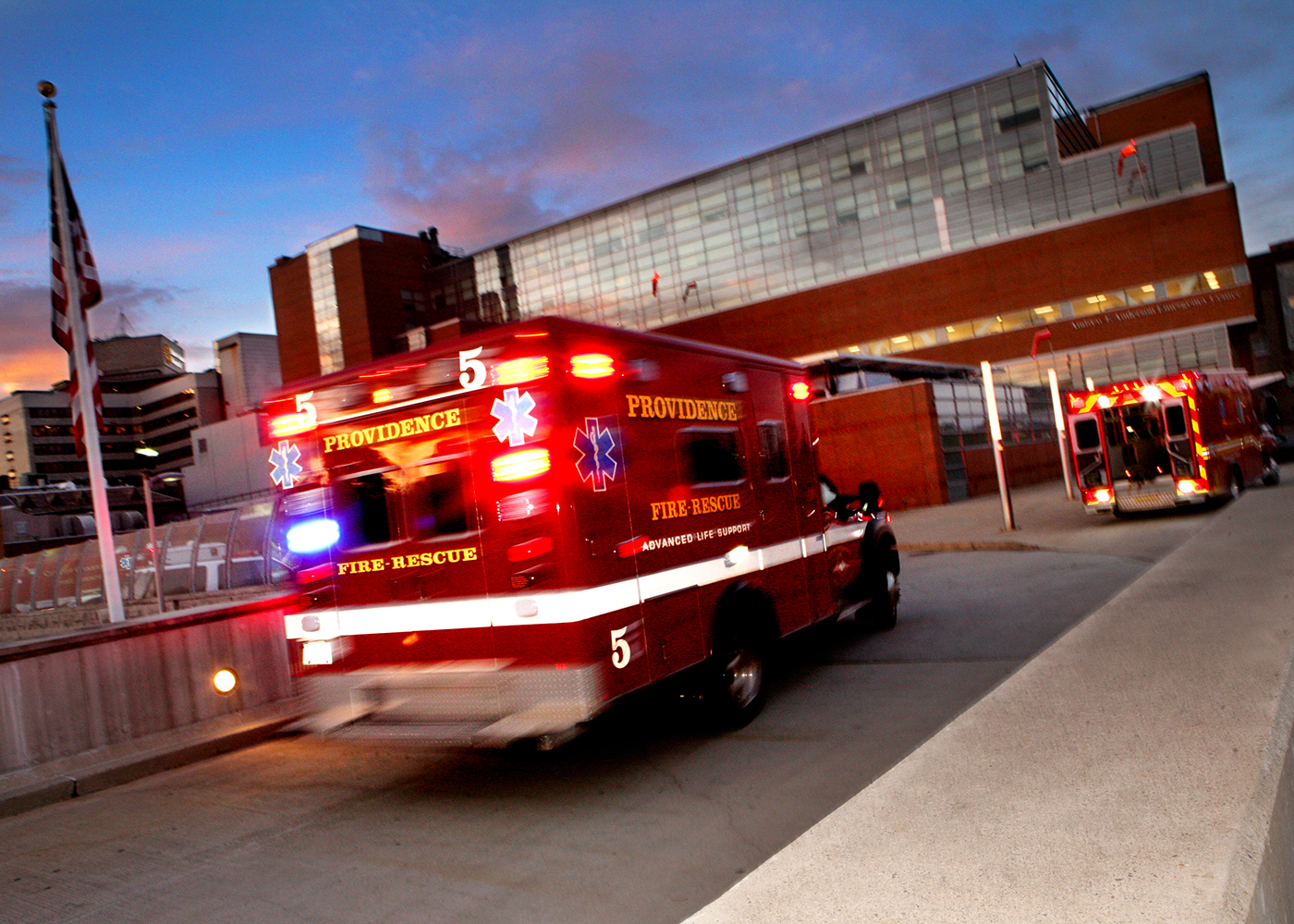 Recent changes in emergency medical services (EMS) point-of-entry stroke protocols and new investments in neurosciences at Rhode Island Hospital have ensured that the best care for stroke patients can be accessed right here in Rhode Island. Updated EMS regulations, a new and improved biplane neurointerventional radiology suite, and reaccreditation by the Joint Commission cement Rhode Island Hospital’s Comprehensive Stroke Center as the top choice for stroke care in Rhode Island.
Recent changes in emergency medical services (EMS) point-of-entry stroke protocols and new investments in neurosciences at Rhode Island Hospital have ensured that the best care for stroke patients can be accessed right here in Rhode Island. Updated EMS regulations, a new and improved biplane neurointerventional radiology suite, and reaccreditation by the Joint Commission cement Rhode Island Hospital’s Comprehensive Stroke Center as the top choice for stroke care in Rhode Island.
The Comprehensive Stroke Center at RIH, a level one stroke center, has partnered with EMS professionals statewide to provide education of stroke point-of-entry protocols, with the goal of changing regulations and enabling patients in the state to be taken directly to Rhode Island Hospital in the event of a stroke. Previously, when a stroke patient called 911 for an ambulance, that ambulance would take them to the nearest hospital to be evaluated, rather than directly to the Comprehensive Stroke Center at Rhode Island Hospital. Timing is critical for stroke care, and patients frequently required transfer to Rhode Island Hospital from other local hospitals. In that situation, patients often experienced profound delays in care, sometimes leading to disability and preventable death. To overcome this and transform our systems of care, more than 50 educational sessions were held with EMS professionals statewide to improve prehospital care and get the right patient to the right place the first time.

Comprehensive Stroke CenterThe Lifespan Comprehensive Stroke Center provides the highest level of stroke services in Rhode Island, with access to the latest treatment and technology. Learn More |
Beginning two years ago, EMS professionals were empowered to transport patients with suspicion for severe stroke (a LAMS score of 4 or 5) directly to Rhode Island Hospital if the transport time was less than 30 minutes. Los Angeles Motor Scale, a stroke severity tool used by EMS to determine which stroke patients are the most severe. Research has shown that stroke patients with a score of 4 or 5 are more likely to be having stroke that requires care at a comprehensive (Level I) stroke center.
Armed with data on improved outcomes from that effort, the Rhode Island Ambulance Service Advisory Board met on March 13, 2019 and EMS leaders removed the 30-minute restriction, enabling all Rhode Islanders exhibiting severe stroke symptoms to come directly to the Comprehensive Stroke Center at RIH. This aligns with other time-dependent point-of-entry protocols for EMS including trauma, which has a 45-minute restriction, and STEMI, which has no time restriction as spelled out in the Rhode Island EMS Protocols. In keeping with our mission to deliver the most efficient initial hospital care, EMS professionals are educated to pre-notify the stroke team and relay important information about the patient while on the way to Rhode Island Hospital. “Our partnership with EMS professionals has enabled us to transform stroke care delivery here in Rhode Island,” says Ryan A. McTaggart, MD. “The action of the Ambulance Service Advisory Board demonstrates how essential EMS professionals are to delivering good outcomes for our community.”
A new biplane neurointerventional radiology suite at Rhode Island Hospital, equipped with the latest technology and staffed 24/7, is now situated less than 100 steps away from the ambulance bays – in fact, no other emergency department in the world has this stroke surgery suite within it. Patients are received by EMS in the emergency department and if necessary, can be rushed to the neurointerventional radiology suite for a mechanical thrombectomy, saving precious minutes. Mechanical thrombectomies are only available at comprehensive stroke centers, and Rhode Island Hospital is the only one in the state.
The Comprehensive Stroke Center was also reaccredited by the Joint Commission this year. Its first accreditation by this group made Rhode Island Hospital the first hospital in the state to receive this honor. Accredited centers are given this title for demonstrating the ability to evaluate and treat the most complex stroke cases and provide comprehensive services focused on acute management, risk factor modification, and recovery. The Comprehensive Stroke Center at Rhode Island Hospital has also earned the distinction of attaining the American Stroke Association’s Target Stroke Honor Roll Elite Plus status, thereby confirming excellence in acute stroke treatment. All of this is achieved in a state-of-the-art setting with access to the latest treatment and technology.
To refer a patient to the Comprehensive Stroke Center, call 401-444-8806.
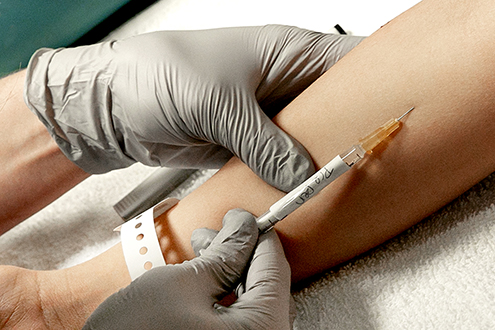 Radium 223 for Prostate Cancer Patients with Bone Metastases
Radium 223 for Prostate Cancer Patients with Bone Metastases
The Lifespan Cancer Institute at The Miriam Hospital is now offering a new prostate cancer treatment called radium 223, also known as Xofigo. This new drug is meant to extend the lives of prostate cancer patients whose condition has spread into their bones and who are no longer responding to hormonal or surgical therapies that lowers testosterone. The radiology department's division of nuclear medicine at The Miriam is the only licensed provider in the state to offer this treatment option. It is intended to extend life by about 30%. Studies found that radium 223-treated men lived 14.9 months longer than expected, while the placebo-treated men’s lives were extended by 11.3 months.
This radio pharmaceutical therapy uses a radioactive material to penetrate the areas in the patient’s bones where the cancer cells have spread. The radiation is strong enough to kill the cancer cells but has a short range, so that it effects limited damage to the healthy cells around it. The treatment causes cell death via double-strand DNA breaks in osteoblasts, osteoclasts, and metastatic prostate cancer cells in the bone. The treatment takes place over a six-month period with patients receiving one injection per month.
To refer patients for this treatment, please contact the Division of Nuclear Medicine at 401-793-4672.
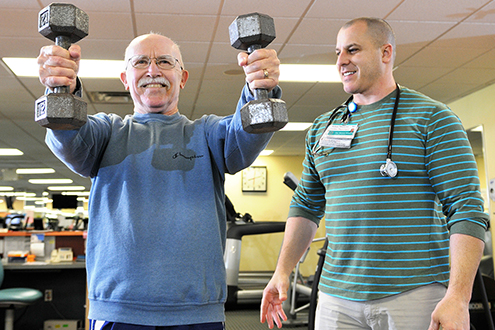
Structural Heart ProgramProvides innovative care for patients with advanced and complex structural heart disease. Learn More |
LCVI Structural Heart Program Expands Services
The Lifespan Cardiovascular Institute's Structural Heart Program has expanded to include TAVR and Mitraclip treatments for congestive heart failure patients after achieving important milestones. Since 2012, the providers in this program have performed more than 600 transcatheter aortic valve replacement (TAVR) procedures, and since 2016, more than 50 procedures were done to insert the Mitraclip device. TAVR is a potentially lifesaving treatment option for patients who are at intermediate or high risk of complications because it is a safe alternative to surgical aortic valve replacement. TAVR can relieve the symptoms of aortic stenosis, allows patients to recover faster and discharge from the hospital sooner, and improve overall survival. Mitraclip is a minimally invasive, catheter-based procedure that treats symptoms of a leaky heart valve from a damaged or defective mitral valve. Mitraclip is an option for patients who have severe, symptomatic, degenerative mitral valve regurgitation, but who are at too high a risk to undergo surgery to repair or replace the valve.
The Structural Heart Program continues to adapt as newer models of devices are released and guidelines are updated to cover a broader scope of patients who have symptoms of aortic stenosis or mitral regurgitation. The milestones achieved in this program in the last few years show the immense amount of experience and expertise that our providers have gained through these treatments after only a few years of use. Expanding the Mitraclip treatment option to congestive heart failure patients allows providers to treat more people who suffer from symptoms of heart failure that are related to a leaky mitral valve. The program is always evolving to meet the needs of our patients and improve overall quality of life.
To refer a patient to the Structural Heart Program at the Lifespan Cardiovascular Institute, call 401-444-8712.
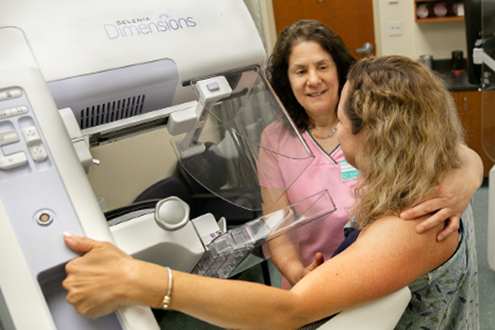 Women’s Medicine Collaborative Adds State-of-the-Art Imaging
Women’s Medicine Collaborative Adds State-of-the-Art Imaging
Beginning in January 2019, the Women’s Medicine Collaborative (WMC) introduced a new 3D mammography device, making it the most updated mammography machine that’s available within and outside of Lifespan. The center also added a brand-new ultrasound device that encompasses the most advanced obstetric imaging capabilities. Imaging services at the Women’s Medicine Collaborative are operated by Lifespan Medical Imaging and The Miriam Hospital. With this expansion to the maternal fetal medicine program, we are now able to provide ultrasound and obstetric care to non-Lifespan patients; a service that was previously not available. Prior to this new technology, patients of the WMC were required to undergo mammograms at locations different from where they saw their providers.
The addition of the latest ultrasound and mammogram technology at the Women’s Medicine Collaborative has streamlined services. With 3D mammography, high clarity images increase early detection, decrease false positives, and help pinpoint the size and location of any abnormality.
The center on West River Street has offered bone density and pulmonary function testing since 2012 and added limited obstetric ultrasound services in 2015, but previously needed to send patients to Collyer Street for important services like mammograms. Patients have expressed their approval for the ability to receive services in the same location as their providers. Many patients opt to have their ultrasounds, bone density tests, pulmonary function tests and mammograms on the same day as their appointments, and are pleased to find that these high-quality machines are now in one location.
To learn more about breast imaging at Lifespan, visit us online or call 401-444-7770 to refer a patient. To learn more about the maternal fetal medicine program or to refer a patient, call 401-793-7022.
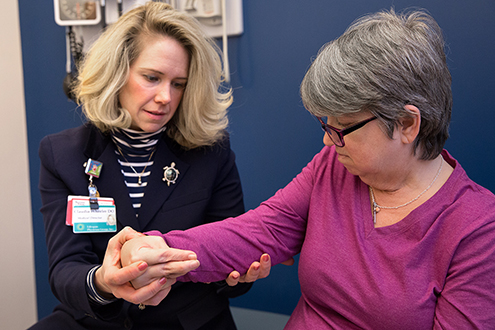 Rhode Island Hospital Introduces Physical Medicine and Rehabilitation Department
Rhode Island Hospital Introduces Physical Medicine and Rehabilitation Department
Rhode Island Hospital recently announced its new department of Physical Medicine and Rehabilitation. These providers focus on enhancing and restoring functional ability and quality of life to those with physical impairments or disabilities, affecting the brain spinal cord, nerves, bones, joints, ligaments, muscles, and tendons. The clinicians at the physical medicine and rehabilitation department, referred to as physiatrists, treat conditions including pain, stroke, spinal cord injury, traumatic brain injury, amputations, cerebral palsy, Parkinson’s disease, multiple sclerosis, spina bifida, myopathy, and post-polio. Unlike other medical specialties that focus on a “cure,” physiatrists' goals include maximizing patients’ independence in daily living and improving quality of life.
Physiatrists act as liaisons between patients and other providers and are experts in designing comprehensive, patient-centered treatment plans using an interdisciplinary model. They guide the patient’s rehabilitative journey from the hospital, to inpatient rehabilitation or outpatient setting and ideally, back to their community with improved function. The department was created in an effort to consolidate and streamline clinical credentialing, enhance program development, track quality outcomes, and advance the level of care and service that physiatrists provide. The department is multidisciplinary and includes 12 physiatrists who practice across Lifespan or in the community, two anesthesiologists, and five advanced practice providers. They see patients at the Comprehensive Spine Center, inpatient rehabilitation units, Concussion Care Center, and at an outpatient physiatry practice on Allens Avenue in Providence. Physiatrists also play a significant role in neurology, neurosurgery, stroke, and cancer care. Physiatrists truly treat the whole patient by helping them gain independence, enhance their quality of life, and build self-efficacy.
To refer a patient to Physical Medicine and Rehabilitation, call 401-606-4778.
The Miriam Hospital Announces New Interventional Radiology Suite
The Miriam Hospital is excited to announce their new fully operational interventional radiology suite, equipped with the latest technology. The new equipment, which includes intraprocedural CT devices with 3D capabilities and 3D angiographic devices, has enabled us to expand our capabilities in delivering care to our patients at the highest level.
The capabilities available in the new suite allow for the intraprocedural CT scan imaging to create anatomic images that precisely guide treatment and minimize procedure time. Combined with utilizing the lowest possible radiation dose to patients, its unique technology precisely guides needles and catheters to perform a wide variety of minimally invasive therapies, such as cancer and vascular disease treatments.
Visit our website to learn more about the procedures performed by Lifespan Vascular and Interventional Radiology.

Lifespan Physician Group Plastic SurgeryOur surgeons provide a full range of services, including reconstructive procedures, craniofacial reconstruction, and cleft repair, hand, and cosmetic surgery. Learn more |
3D Printer Enhancing LPG Plastic Surgery Services and Supporting Education
Lifespan Physician Group Plastic Surgery has developed the first medical 3D printing lab in the state of Rhode Island. The lab houses high-quality 3D printing technology that is being used to aid in surgical procedures and in education. This state-of-the-art machine works by depositing droplets of liquified plastic in multiple layers to create a solid object. The models the machine creates allow surgeons to pre-plan procedures and helps minimize operative times while also decreasing complication rates. The printer is used to create solid, 3D models of skulls, spines, and bones of patients who are about to undergo surgery. With this technology, surgeons can handle and view different angles of a patient’s bones, which helps determine the most effective course of each procedure before entering the operating room. These models are also beneficial in helping patients understand their diagnoses and upcoming surgeries.
Models created by the 3D printer are also being applied to education and used in the classrooms at The Warren Alpert Medical School of Brown University. Now, medical students can practice various procedures on a model before they graduate to working on a live patient. Students have been learning to suture wounds and incisions by working on a model of a body part, with the bone made of 3D printed materials and the flesh and muscles made of a silicon substance.
LPG Plastic Surgery has been employing the printer to not only their own practice, but offering its services to other departments as well. One patient was missing part of her nose after suffering from cancer; in the past, surgeons would have to take a plaster mold of her face and the face of a friend or relative to create a new nose prosthetic—an uncomfortable and likely cumbersome procedure. With 3D printing technology, surgeons were able to take a digital scan of the patient’s face, draw and sculpt her nose, and 3D print the prosthetic. Orthopedics and neurosurgery have also been benefiting from the printer, as it is able to print out models of spines for scoliosis and spinal tumor patients who require surgery. Physicians can now physically show their patients exactly how their operations will proceed before the surgery even begins.
To refer a patient or learn more about Lifespan Physician Group Plastic Surgery, call 401-444-5495.
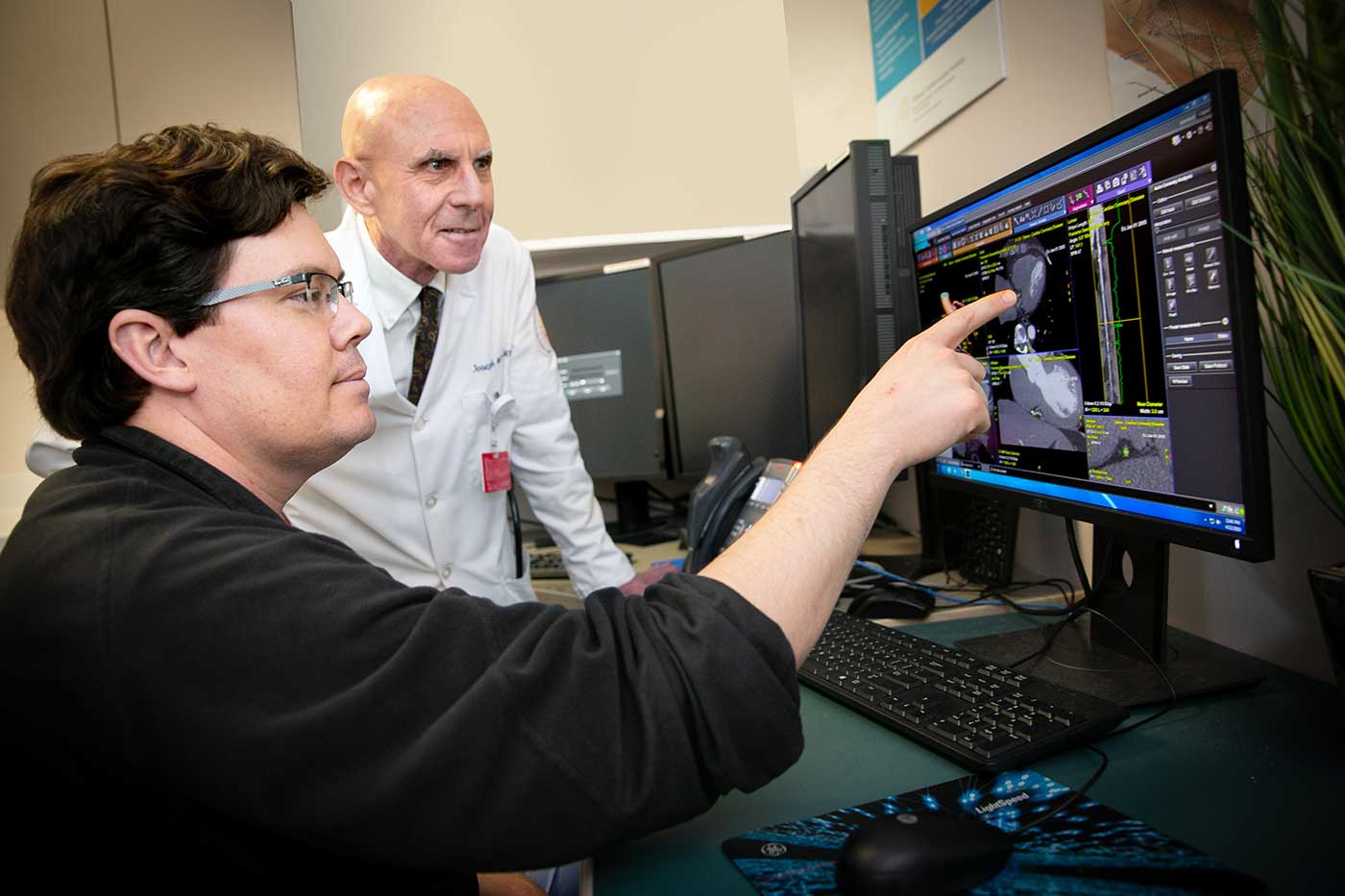 Cardiac CTA and Calcium Scoring Now Available at Newport Hospital
Cardiac CTA and Calcium Scoring Now Available at Newport Hospital
Two new state-of-the-art tests for coronary artery disease are now offered at Newport Hospital, through a collaboration between cardiologists at the Lifespan Cardiovascular Institute and interventional radiologists at Aquidneck Radiology.
Coronary CTA (computed tomography angiogram) is a non-invasive test that provides a picture of the arteries that supply blood to the heart, showing precisely where they have become narrowed or blocked. CT technology has only recently achieved adequate resolution to visualize coronary circulation with this sensitivity. For patients with chest pain or shortness of breath, this test can determine if the symptoms are related to inadequate blood supply to the heart.
Calcium scoring, also known as a heart scan, uses CT technology to identify calcium deposits or plaque in the arteries. The more extensive the calcium deposits, the greater the risk of having a heart attack. Calcium scoring is a valuable method for evaluating the risk of heart attacks in patients who do not have symptoms of chest pain or shortness of breath.
Coming soon, the team will also be implementing a HeartFlow component, which converts structural information from the CT angiogram into functional information based on modeling of the flow through arteries. It employs fluid dynamics to predict whether a segment of narrowing is likely to be related to exertional symptoms. Paired with the coronary CTA, this non-invasive method enhances the predictive value of the study and can provide a comprehensive assessment of coronary anatomy and function. Newport Hospital would be the only site in the state currently able to perform and read these studies.
To refer a patient for cardiac CTA or calcium scoring at Newport Hospital, call 401-845-1338.
Newport Hospital Launches TeleSitters for Patient Safety Monitoring
Newport Hospital has debuted the use of a TeleSitter system, allowing staff to monitor multiple at-risk patients simultaneously via video and use two-way audio to communicate to the bedside. The system has been demonstrated to increase patient safety, reduce falls in high-risk patients and reduce staff injuries.
The system consists of portable units that can be moved into rooms where they are most needed—for example, for those patients at high risk for falls. The units are equipped with a movable camera, digital two-way audio, infrared light for low-light viewing, and stat alarm. The system uses client software for the monitoring station that includes specific patient care information. When needed, a member of the care team can request privacy mode, so that the patient is not on camera during provider exams or specific care interventions.
Lifespan Recovery CenterOur center offers patients a multidisciplinary, evidence-based, recovery-oriented program that meets the full spectrum of medical and social needs of individuals who have opioid use disorders. Learn more |
Lifespan Recovery Center Recognized as Center of Excellence
After just two years of operation, the Lifespan Recovery Center has been named a center of excellence by the Rhode Island Department of Behavioral Healthcare, Developmental Disabilities and Hospitals. A center of excellence recognition is given when the program has successfully demonstrated that it utilizes evidence-based practices and coordinates the care of individuals with moderate to severe opioid use disorder. The center ensures timely access to appropriate, high-quality, medication-assisted treatment by admitting individuals diagnosed with opioid use disorder within 48 hours, Saturday through Thursday, and within 72 hours for referrals made on Friday.
As a center of excellence, the Lifespan Recovery Center will provide patient-centered care to stabilize individuals on FDA-approved medications (e.g., buprenorphine products, naltrexone), engage patients in intensive clinical support such as group or individual counseling and peer recovery, promote recovery and eventually refer to less intensive community-based care following six months of treatment.
To refer a patient to the Lifespan Recovery Center, call 401-606-8530.
New Service Locations
Rehabilitation Services Opens New Location in Central Falls
Lifespan Rehabilitation Services is proud to announce the opening of a new location in Central Falls. Just last month, the new location began offering a wide range of services including physical therapy, occupational therapy and speech language pathology for both pediatric and adult patients. As with other Lifespan Rehabilitation locations, patients seen at the Central Falls location will have access to Lifespan’s network of experts in all medical disciplines across the region and can be referred to external services as needed.
The center is located at 1000 Broad Street, Suite 103, Central Falls, RI 02863. Call 401-606-7492 for more information. Referrals may be faxed to 401-606-7493.
Lifespan Cancer Institute Opens Locations in Lincoln and Pawtucket
Lifespan Cancer Institute is adding two new locations in Lincoln and Pawtucket in the fall of 2019.
Conveniently located at 701 George Washington Highway (Route 116), the center in Lincoln will be a full site for cancer care, including physician visits, specialty care, oncology services, and lab draw stations.
The new site at 407 East Avenue in Pawtucket opens in response to the need for a local center after the closing of Memorial Hospital. The goal of this opening is to give access to previous Memorial Hospital patients or any patients who live in the Pawtucket area. The Pawtucket site will offer physician office visits only.
For more information, contact Sue Korber at 401-444-9370.

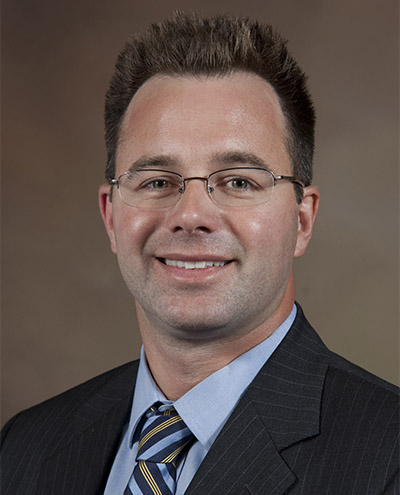 Dr. Christopher M. Matkovic Named Medical Director of Recovery Center
Dr. Christopher M. Matkovic Named Medical Director of Recovery Center
Christopher M. Matkovic, MD, was appointed medical director of the Lifespan Recovery Center.
Dr. Matkovic is also the director of adult psychiatry emergency services and of the division of forensic psychiatry at Rhode Island Hospital. He also holds an appointment as clinical assistant professor of psychiatry and human behavior at The Warren Alpert Medical School of Brown University.
Dr. Matkovic earned his medical degree from St. George’s University School of Medicine in Grenada, West Indies. He completed his residency in adult psychiatry at Stony Brook University Hospital, his fellowship in child psychiatry at The Warren Alpert Medical School of Brown University and Rhode Island Hospital, and his fellowship in forensic psychiatry at New York University School of Medicine and Bellevue Hospital. He is board-certified in psychiatry, child psychiatry and forensic psychiatry, and holds additional board certification in addiction medicine through the American Board of Addiction Medicine.
His research interests include juvenile substance abuse, emergency psychiatry, and suicide prevention for at-risk individuals in the year after their release from prison. He supervises addiction medicine fellows, forensic psychiatry fellows, and medical students and residents in the psychiatric emergency service. He serves as the consulting director of psychiatry at the Adult Correctional Institute in Cranston. The Lifespan Recovery Center team is excited to welcome Dr. Matkovic as their medical director.
